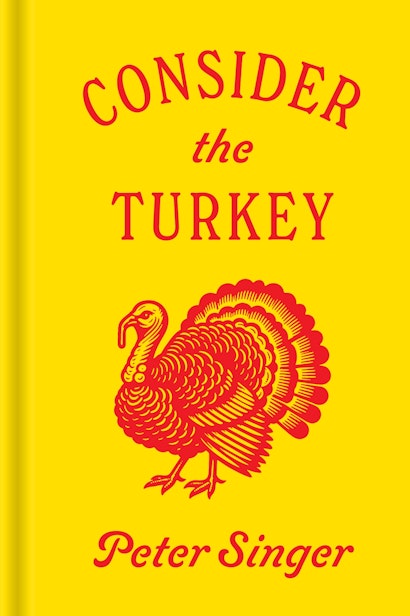A turkey is the centerpiece of countless Thanksgiving and Christmas dinners. Yet most of us know almost nothing about today’s specially bred, commercially produced birds. In Consider the Turkey, bestselling author Peter Singer tells their story—and, unfortunately, it’s not a happy one. Above all, Singer explains how we can improve our holiday tables—for turkeys, people, and the planet—by liberating ourselves from the traditional turkey feast.
Most people know little about specially bred, commercially produced turkeys. As we head toward the holiday season, what are one or two important things you’d want consumers to know?
PS: One fact that may surprise people is that the standard American turkeys—known as “broad-breasted whites” have been bred to have such a large breast—in fact, to be so misshapen—that it is physically impossible for them to have sex. So, they exist only because of artificial insemination. There are people who spend their working days masturbating male turkeys and others who grab the females and force them into a position in which the semen collected from the males can be squirted into their sexual organs. In natural conditions, female turkeys are very selective about which males they will allow to mate with them, so it is not surprising that they hate the violation involved in being grabbed and forced open.
Something else people do not know is that U.S. turkey producers kill millions of birds each year by a brutally cruel method known as Ventilation Shutdown Plus. I won’t give the details here, but they are in the book.
In the European Union and United Kingdom certain practices that mass production farms in the United States use on animals are banned. Why should the United States change its policies and practices to better protect animals?
PS: In those countries, it is not permitted to kill animals using Ventilation Shutdown Plus. There are also space requirements that limit the degree of crowding permitted in factory farms and ensure that animals have more room to move—still not nearly enough, I believe, but still better than in the United States, where, in the major turkey producing states, there are no such prohibitions. If we are going to eat animals, we should not produce them in conditions that ignore their most basic welfare needs.
Are taxpayers subsidizing turkey producers?
PS: Official US Department of Agriculture records show that between February 2022 and April 2024, Jennie-O Turkey Store, which is owned by the giant Hormel Foods Corporation, received federal government payments of $105,855,157 to compensate it for turkeys it had killed before they were ready to be marketed. Many of these turkeys were killed by Ventilation Shutdown Plus, the cruel method banned in the United Kingdom and the European Union. Many other turkey producers received millions as well, among them another giant, Tyson Foods, one of the world’s largest meat producers. So yes, taxpayers who do not buy turkey are subsidizing those who do.
What are actionable changes that readers can make to support and sustain a better world?
PS: The first and most straightforward thing you can do is simple. Stop buying turkey and tell your family that you are not going to eat turkey at Thanksgiving or at any other family meal. There are far less cruel ways to celebrate festivals, and Consider the Turkey includes some suggestions on what alternatives you can try.
Apart from that, support animal advocacy organizations like The Human League, Mercy for Animals, and PETA so that they can continue their work to reduce the suffering of all animals, including those raised for food in factory farms.
Any suggestions for vegetarian alternatives, or favorite recipes?
PS: I provide several suggestions in a section of Consider the Turkey called “Recipes for Ethical Feasting.” The recipes range from Sichuan Tofu and Chinese Cabbage, which is about as far away from a traditional roast turkey as you can get—and much tastier too, in my opinion—to Seitan “Turkey,” for those who want a high protein tasty dish that looks like a turkey in the center of the Thanksgiving table.
Peter Singer is professor emeritus of bioethics at Princeton University and has been described as the world’s most influential philosopher. His many books include Animal Liberation, Practical Ethics, The Life You Can Save, and Ethics in the Real World (Princeton).

